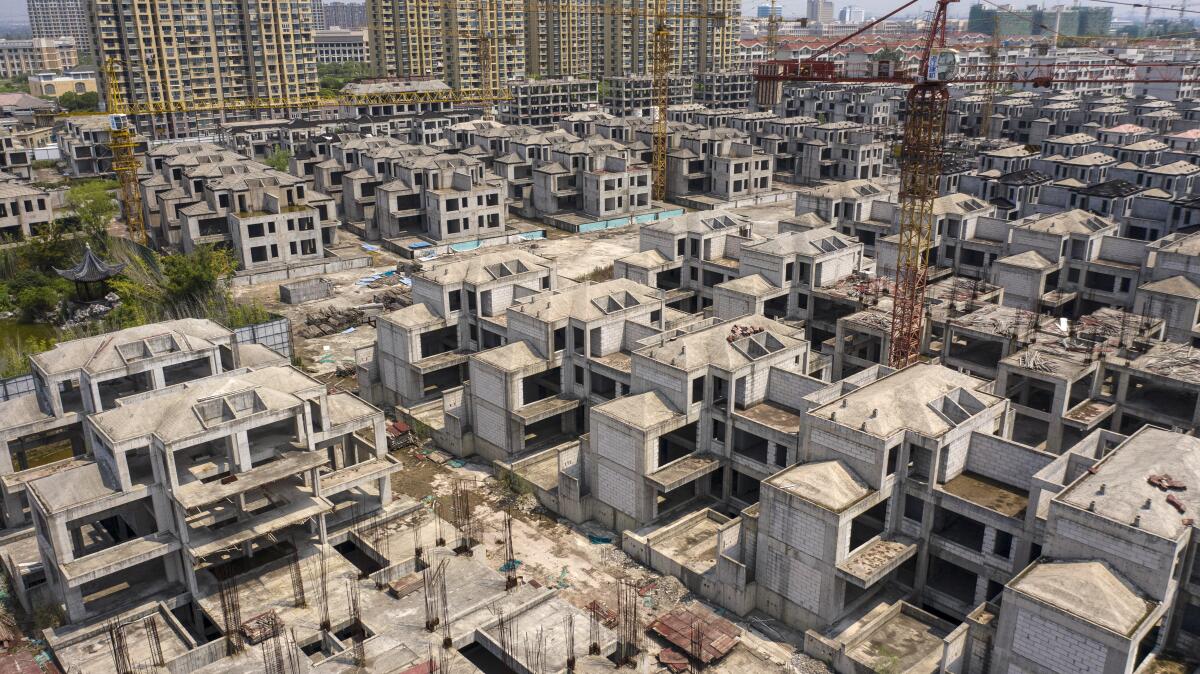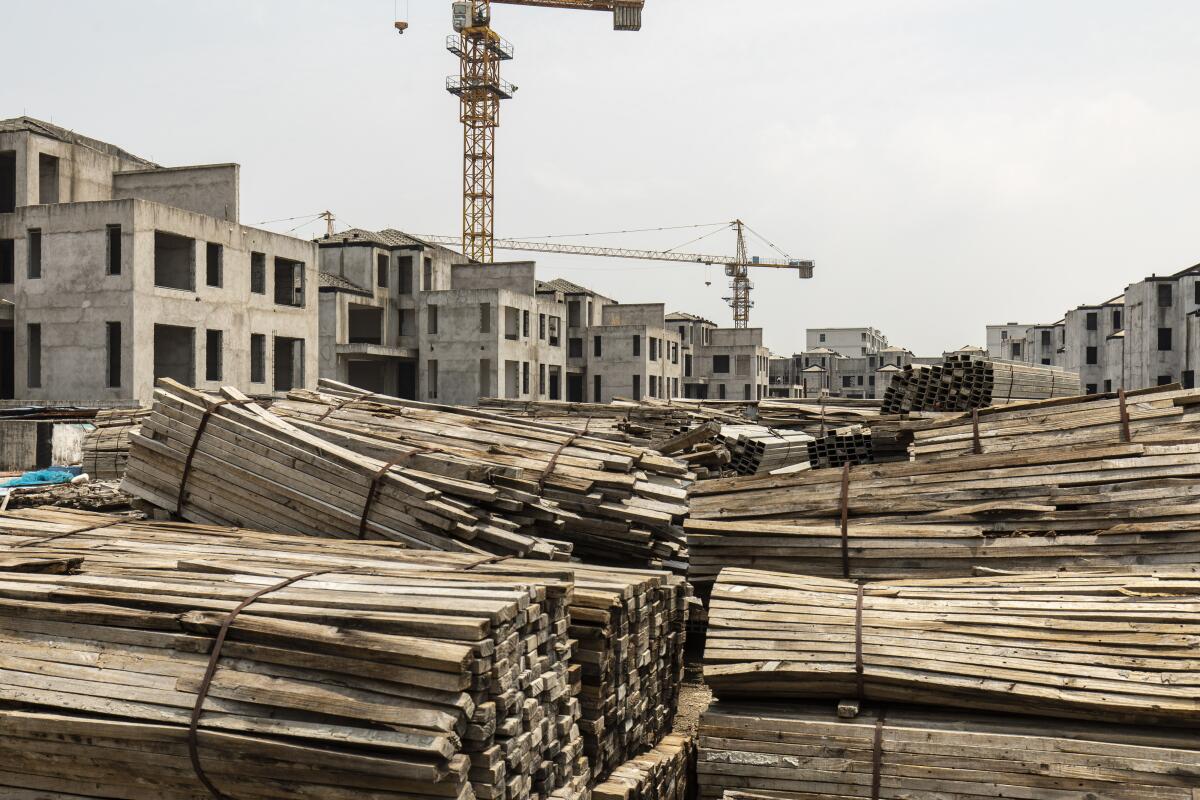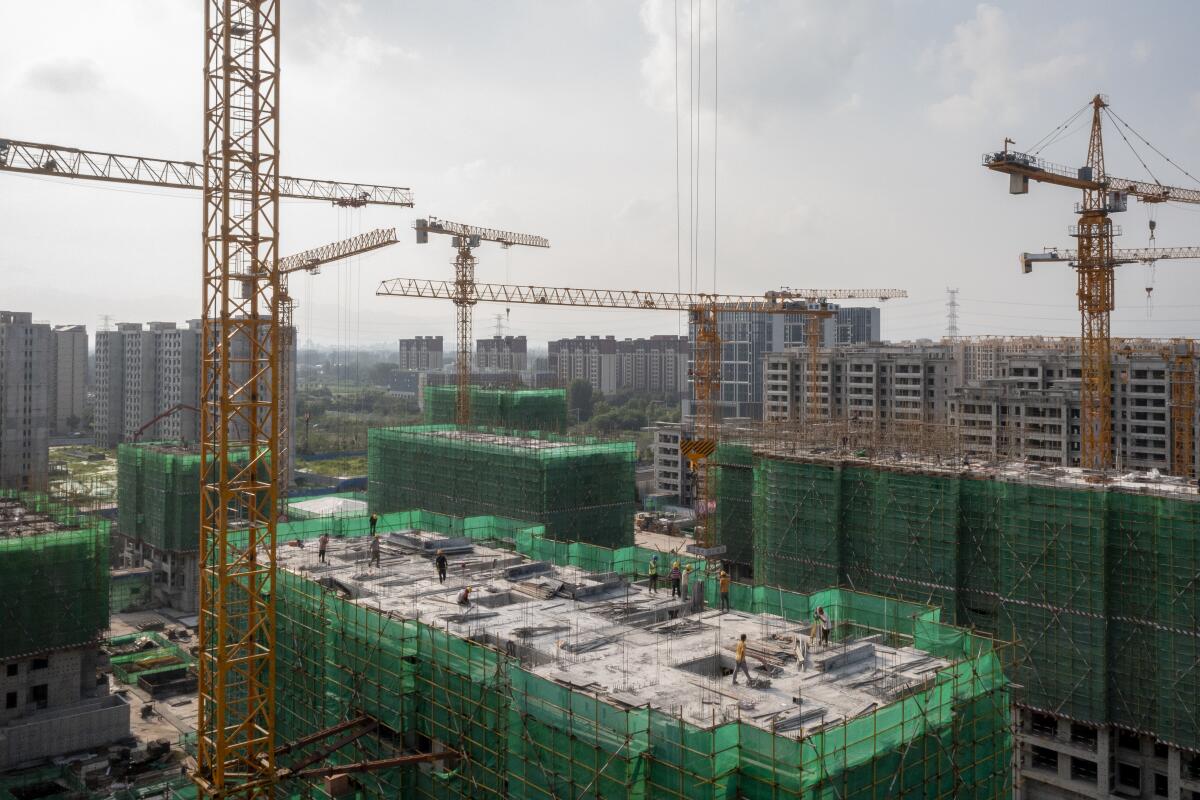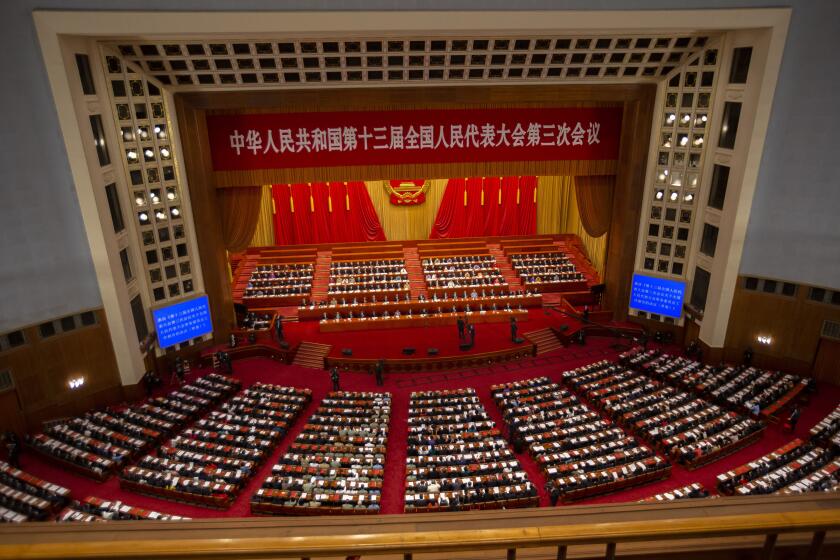The Chinese dream of homeownership is crumbling. The economy could go with it

- Share via
TAIPEI, Taiwan — Last November, hundreds of angry homeowners in Nanchang, the capital of China’s Jiangxi province, gathered on the roof of an unfinished apartment building. From their perch, they unfurled red and white banners along the outer walls and chanted demands for completion of the homes they had already partially paid for. On the dirt below, workers inflated a large airbag to catch anyone who jumped.
Nearly 500 miles away in Shanghai, a 26-year-old interior designer watched video of the protest on social media, and saw her life plan falling apart.
The woman and her husband, who requested anonymity to avoid retribution, had purchased a three-bedroom unit in the sprawling Xinli City project presale in August 2019. Just a few hours’ drive from both their hometowns, the development was touted as a “750,000-square-meter city of ideal life,” with a day-care center for the couple’s young child. It should have been finished that November. It wasn’t until she saw the video that she learned construction had stopped three months earlier.
Like the vast majority of Chinese home buyers, they had begun making payments before construction was completed. For years, this type of arrangement, which accounts for more than 80% of China’s home sales, gave developers easy access to funds and fueled rapid expansion as home prices soared.

But with financing drying up and debts coming due, the resulting cash crunch has left thousands of units unfinished, and owners boycotting their mortgages in protest.
Demands for answers have elicited excuses, threats or detention, the woman said, and have pushed Xinli City homeowners to take desperate measures. Last month, she stopped paying her 30-year mortgage, along with thousands of others who had bought half-built homes there.
“It’s gotten to the point where no one is taking care of it. So we naturally also have to defend our own rights,” said the woman. “If we the people are not happy, it’s difficult to have a stable society.”
China’s ceremonial parliament opens its annual session on Saturday with the government facing a slowing economy and international pressure over its refusal to condemn Russia’s invasion of Ukraine.
Such boycotts, which have spread to more than 300 projects in over 100 cities, are the result of a growing crisis that strikes at the heart of both economic and political stability in China. The property sector accounts for about a quarter of China’s economy, and its deterioration is spreading financial duress among domestic industries. The ramifications threaten to spill over into the global economy, undermining the possibility that China’s growth engine could help lift the world out of a potential recession.
The red-hot real estate industry has contributed immensely to China’s rapid economic rise and the dream of home ownership. With more than half of household wealth tied up in housing, the repercussions of a hard landing in the real estate sector have long been a major economic worry.
Hoping to ease what had become an unsustainable housing boom, the government implemented new lending requirements in 2020 to deter excessive borrowing. As some developers struggled to pay back debt, sales slowed and investors soured, pushing the sector into a downward spiral compounded by pandemic pressure.
“I think authorities underestimated, if a few companies got into trouble, what the effect would be,” said Bert Hofman, director of the East Asian Institute at the National University of Singapore.

What was once a virtuous cycle has turned vicious. Home prices fell for the 11th straight month in July, and dozens of developers, including real estate behemoth Evergrande Group, have defaulted on their debts. The impact has rippled through land sales, labor, construction materials and home appliances.
“We are seeing it everywhere,” said Michael Pettis, a professor of finance at Peking University’s Guanghua School of Management. “You get these spreading waves, and the bigger the sector is, the more powerful those waves are. And in China, unfortunately, the property sector is huge.”
An exacerbated slowdown in China, a major commodities consumer and the world’s second-largest economy, would also have pronounced impact on the global financial system in its fragile state.
Countries worldwide are under pressure from rampant inflation and snarled supply chains. Russia’s invasion of Ukraine has disrupted supplies such as natural gas, oil and grain. The U.S. economy just shrank for the second quarter in a row, and the war has dampened consumer confidence and manufacturing in major European economies. In July, the International Monetary Fund downgraded its global growth projections as risks from China’s zero-COVID policy and housing crisis grew.
In March, Chinese officials were still hoping to hit 5.5% growth this year, an ambitious goal that, if fulfilled, would still mark the country’s slowest expansion in three decades. Those hopes have been dashed by President Xi Jinping’s hard-line approach to COVID-19 outbreaks, as harsh lockdowns have stymied economic activity.
The country is simultaneously grappling with a slowdown in private enterprise wrought by regulations meant to mitigate income inequality. Last year, China’s immense technology industry was brought to heel for what authorities saw as unscrupulous business practices. Another crackdown on for-profit education companies crimped the lucrative private tutoring market. As growth has slowed, companies have laid off workers, and urban youth unemployment reached record highs this summer.
All this has added to a growing sense of disillusionment and pessimism within China’s middle class. Last year, many Chinese people embraced the philosophy of “lying flat,” a rejection of toiling in the country’s rat race for diminishing marginal returns. This year, the extreme lockdown that confined millions to their homes in Shanghai begat a bleaker phase: “let it rot.”
Although the mortgages at risk are estimated to be a fraction of the country’s total, mistrust born out of the boycotts could further weigh on consumer confidence, at a time when the inclination to save amid economic uncertainty is at its highest level in decades.
For the interior designer, buying a home someday was always a given. She and her husband had both grown up in the countryside of Jiangxi province before going to college in Nanchang. Her husband had wanted to work towards buying a small place in Shanghai, but she decided instead to be closer to their families. One month after their child was born in the summer of 2019, they went looking for apartments.
Now the unfinished property in Xinli City looms over their lives. She and her husband have trouble sleeping at night. The authorities from her hometown have called her and even sought out her parents to try to get her to stop demanding that construction restart. To her embarrassment, many back home know about her predicament and seemed to be sneering at her behind her back. “But did we do anything wrong?” she asked.
“Our money wasn’t stolen or snatched, every person worked hard to earn it,” she said. “We just want to live and work in peace and contentment.”
She said they have sunk their life savings, about $104,000, into the apartment. Her anxieties about money worsened during the two-month lockdown in Shanghai, when work from clients stalled and her income plunged. Even though her earnings have since returned to normal, she doesn’t see the point in paying more for a house that may not ever be completed.
She had hoped collective action would force a response. So far she’s been bitterly disappointed.
“For us, buying a home in the province capital already isn’t easy. Now the home is gone, our money is gone, our household is having issues,” she said. “I don’t have much faith in life anymore because of this.”
The housing upheaval is turning into one of the biggest challenges facing Xi at a time when social and economic stability are paramount. The Chinese leader is expected to break precedent with a third five-year term later this year, solidifying his position as the country’s most powerful ruler since Mao Zedong. But officials have been hesitant to turn to major stimulus or bailouts to ease the economic pain.
“Beijing is in a tough position,” said Pettis from Peking University. “If you see a collapse in the property sector, that’s terrible for the economy. But you don’t want the bubble to keep inflating.”
Instead, China’s top leadership has passed the onus onto localities to resolve the boycotts and drive growth wherever they can. But local governments are also suffering from the loss of important sources of financing like land sales, which make up about 40% of their revenue.
Regulators are weighing a moratorium on mortgages for unfinished apartments, and the city of Zhengzhou, which is facing the most boycotts, is setting up a bailout fund for developers to finish projects, Bloomberg has reported. Some housing developments have managed to restart construction, according to Chinese media.
But in Nanchang, banks and developers have remained silent on Xinli City’s future.
Gu, a 32-year-old construction worker who declined to give his first name, has lost his appetite waiting for news on the project. He had purchased his apartment in the spring of 2020, back when an insolvent building and a two-year-plus pandemic still felt unimaginable.
He didn’t think it was possible that such a large development could collapse. Now, the idea of buying a home, particularly one that’s yet to be built, leaves him with a headache and mild sense of panic. “There are too many unstable factors,” he said.
In the wake of the boycotts, he’s noticed a similar shift among others around him — those who once harbored hopes of buying property no longer have that desire.
“In this economy, cash is king, having money on hand is most important,” he said. “Buying a home probably isn’t under consideration anymore.”
More to Read
Sign up for Essential California
The most important California stories and recommendations in your inbox every morning.
You may occasionally receive promotional content from the Los Angeles Times.












